Abacus Election Bulletin: What do Canadians think of the leaders?
August 26, 2021
Each day during the 2021 Federal Election campaign, researchers at Abacus Data will share insights and analysis from our polling in concise, insights-focused reports. To never miss our polls and analysis, subscribe to our newsletter.
It is an understatement to say that how Canadians feel about the political party leaders has a big impact on how they vote. Voters are more likely to vote for a party when they rate the party leader favourably. It’s much harder for someone to vote for a party when they don’t like the leader. Favourability is not enough though. While being well-liked and respected increases the likelihood that someone will vote for you, it does not guarantee someone’s support.
After the first week of the campaign, we surveyed 2,000 eligible voters and asked a series of questions to explore in more depth how people feel about the three main party leaders: Justin Trudeau, Erin O’Toole, and Jagmeet Singh.
Here’s what we found:
JUSTIN TRUDEAU, LIBERAL LEADER
Liberal leader Justin Trudeau is viewed positively by 39% of respondents and negatively by 42%. Another 18% have a neutral view of the Liberal leader. Impressions of the Prime Minister have been fairly consistent over the past year.
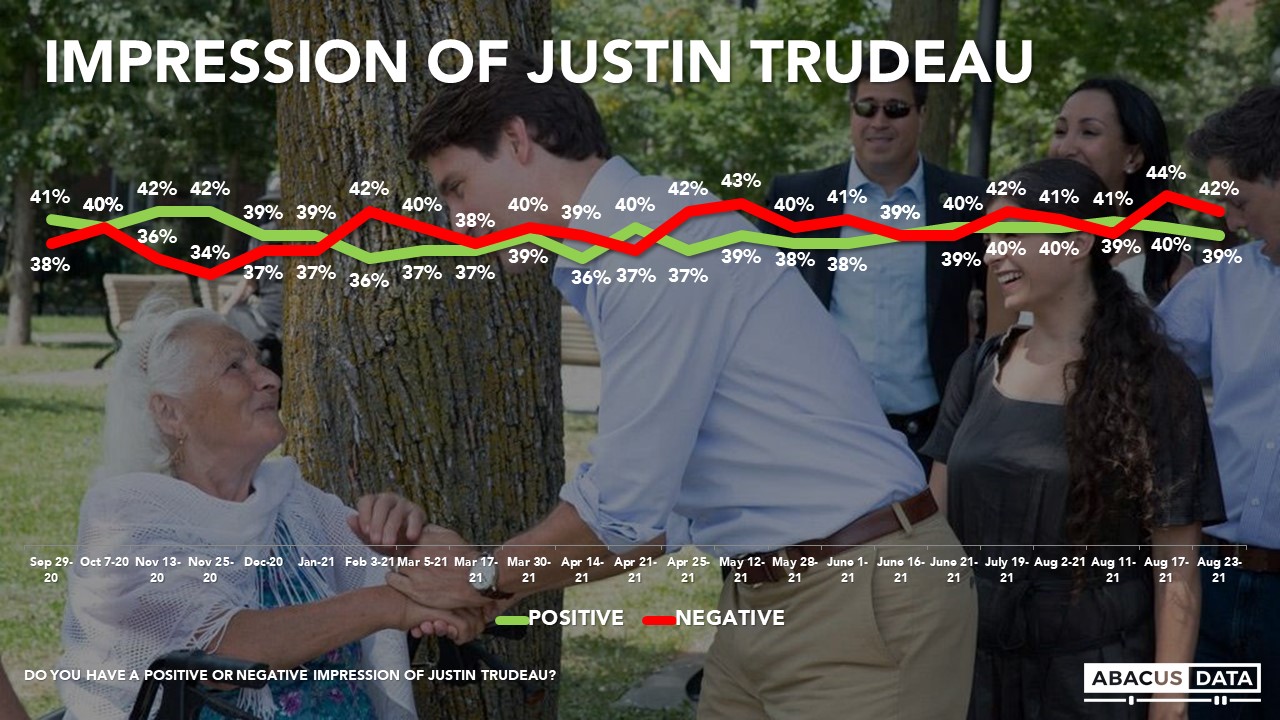
He’s viewed more positively in Atlantic Canada (44%), Quebec (44%), Ontario (41%), and BC (41%) than in the Prairies (26%).
When we dig a bit deeper and ask what it is people like and dislike about him, 30% say they like both his personality and ideas, 10% like his ideas but dislike his personality, while 16% like his personality but dislike his ideas. 36% of respondents say they dislike both his ideas and personality.
- Among those who like both his personality and ideas, 76% would vote Liberal while 15% would vote NDP and 5% Conservative.
- Among those who like his ideas but not his personality, 41% would vote Liberal while 35% would vote NDP and 13% would vote Conservative.
- Among those who like his personality but not his ideas, 37% would vote NDP, 23% Conservative, and 20% Liberal.
This suggests that while personality is important, people’s views of his ideas are a bigger factor in not supporting his party.
In the survey, we also asked respondents to rate how well a series of words and phrases describe Mr. Trudeau. The Liberal leader is seen as friendly and smart by at least half of the respondents. About half also feel he’s compassionate. Fewer feel he’s a strong leader (41%), is empathetic (35%) or shares their values (35%).
On the negative side, 49% feel Mr. Trudeau is fake while 47% would describe him as untrustworthy. As we will show later in this report, this is substantially higher than the other two leaders we tested.

To better understand what attributes best predict whether someone will have a positive or negative impression of Mr. Trudeau, we used multiple regression with the attributes as the predictors of a leader’s overall impression.
For Mr. Trudeau, the strongest predictors of how people feel about him are whether someone thinks they share his values, whether he’s considered a strong leader, and whether people feel he is fake or untrustworthy.
This suggests that for Mr. Trudeau to improve his overall favourability, he needs to continue to connect his values and worldview with the public and demonstrate his strength as a leader. He also needs to work on his authenticity as being perceived as fake is the big detractor to his overall image.
ERIN O’TOOLE, CONSERVATIVE LEADER
Conservative Leader Erin O’Toole is viewed positively by 26% of respondents and negatively by 41%. Another 25% have a neutral view of the Conservative leader while 9% say they don’t know enough to have an impression. Since the start of the campaign, Mr. O’Toole’s positives have improved by 6-points.

Views of Mr. O’Toole are fairly consistent across the country with the exception of the Prairies where he’s viewed more positively.
When we dig a bit deeper and ask what it is people like and dislike about him, 18% say they like both his personality and ideas, 13% like his ideas but dislike his personality, while 9% like his personality but dislike his ideas. 35% of respondents say they dislike both his ideas and personality. 26% say they don’t know enough about him to know suggesting an opportunity for the Conservative campaign to continue increasing his profile.
- Among those who like both his personality and ideas, 76% would vote Conservative, 11% Liberal and 6% NDP.
- Among those who like his ideas but not his personality, 51% would vote Conservative, 26% Liberal, and 13% NDP.
- Among those who like his personality but not his ideas, 42% would vote Liberal, 24% NDP, and 13% Conservative.
- Among those who are unsure about him, 36% would vote Liberal, 26% NDP, 17% Conservative, and 12% BQ. Among this group, 41% are open to voting Conservative further evidence that the Conservative leader can continue to grow support if more people get to know him and like what they see from him.
In the survey, we also asked respondents to rate how well a series of words and phrases describe Mr. O’Toole. Half feel Mr. O’Toole is smart, 40% say he’s friendly, and another 40% think he’s a strong leader. 44% describe him as untrustworthy and 43% think he’s fake.
Like Mr. Trudeau, Mr. O’Toole struggles with empathy (only 32% think he understands people like them but unlike Mr. Trudeau, fewer think he shares their values (32%). Value misalignment is often a barrier for people to consider voting Conservative and Mr. O’Toole struggles with that at the moment.

When we look at the regression model for Mr. O’Toole, the strongest predictors of Mr. O’Toole’s overall impression are whether people think he understands them, whether people think he’s friendly, whether people think he shares their values, and whether people consider him to be untrustworthy and fake.
Unlike Mr. Trudeau, perceived friendliness and empathy are much more important factors in predicting whether people like or dislike Mr. O’Toole. Countering the view that Conservative leaders are uncaring, unempathetic, and out of touch will be important for Mr. O’Toole to improve his overall impressions with voters.
JAGMEET SINGH, NDP LEADER
NDP Leader Jagmeet Singh is by far the most popular leader in the country. 42% have a positive view of him compared with 24% who have a negative view. Since June, his positives are up 10-points.
Mr. Singh is viewed more positively in BC (54%) and less positively in Quebec (34%). He’s around 41-42% in every other region of the country.
When we dig a bit deeper and ask what it is people like and dislike about him, 35% say they like both his personality and ideas, 9% like his ideas but dislike his personality, while 17% like his personality but dislike his ideas. 19% of respondents say they dislike both his ideas and personality. 21% say they don’t know enough about him to know suggesting an opportunity for the NDP campaign to continue increasing his profile. And evidence suggests that as people get to see and hear more from Mr. Singh, the more they like him.
- Among those who like both his personality and ideas, 52% would vote NDP, 30% Liberal, and 9% Conservative. This suggests if the Liberal campaign falters, the NDP could benefit a lot as a substantial portion of Liberal supporters like both Mr. Singh’s personality and ideas.
- Among those who like his ideas but not his personality, 48% would vote Liberal, 20% Conservative, and 18% NDP.
- Among those who like his personality but not his ideas, 48% would vote Conservative, 36% Liberal, and 4% NDP. This is evidence that many of the NDP’s core positions turn off a sizeable group of voters, even if they like Mr. Singh personally.
- Among those who are unsure about him, 39% would vote Liberal, 29% Conservative, 10% BQ, and 8% NDP. Among this group, 32% would consider voting NDP, more evidence that NDP can grow if the party can get him out more or if he performs well in the Leaders’ Debates.
In the survey, we also asked respondents to rate how well a series of words and phrases describe Mr. Singh. Overall, Mr. Singh is viewed more favourably than the other two leaders on all of the metrics.
Two-thirds think he’s friendly, 65% feel he’s smart, and 61% describe him as compassionate. Half think he understands people like them and 48% consider him a strong leader.
On the negative side, 25% think he’s fake while 29% describe him as untrustworthy.

When we look at the regression model for Mr. Singh, the strongest predictors of his overall impression are whether people think he’s a strong leader, whether he shares their values, and whether he is compassionate. Views on whether he’s smart or empathetic don’t impact his overall impression.
Being seen as fake or untrustworthy are important predictors of his image, but not as high as with the other leaders.
For Mr. Singh then, people believe he’s friendly, empathetic and smart. What makes them more likely to think positively of him then is whether they think he’s a strong leader and shares their values. Those are things he can focus on to improve his already strong brand image.
COMPARATIVE ASSESSMENT
Before we wrap up, it’s helpful to look at how people view these leaders in comparison and dig a bit deeper.
Here’s a summary of what attributes people assign to the leaders among those with an opinion. Mr. Singh is more likely to be seen as friendly, compassionate, and smart than the other two leaders. He also scores higher on “strong leader”, empathy and “shares my values”.
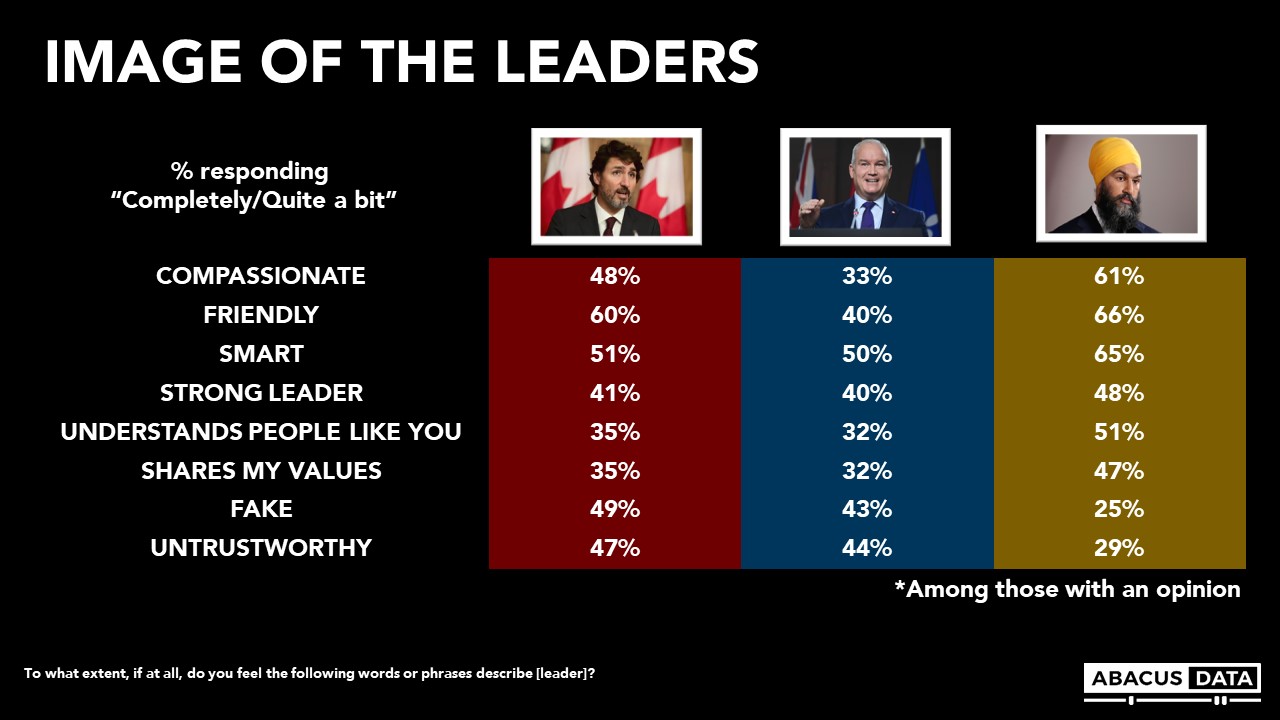
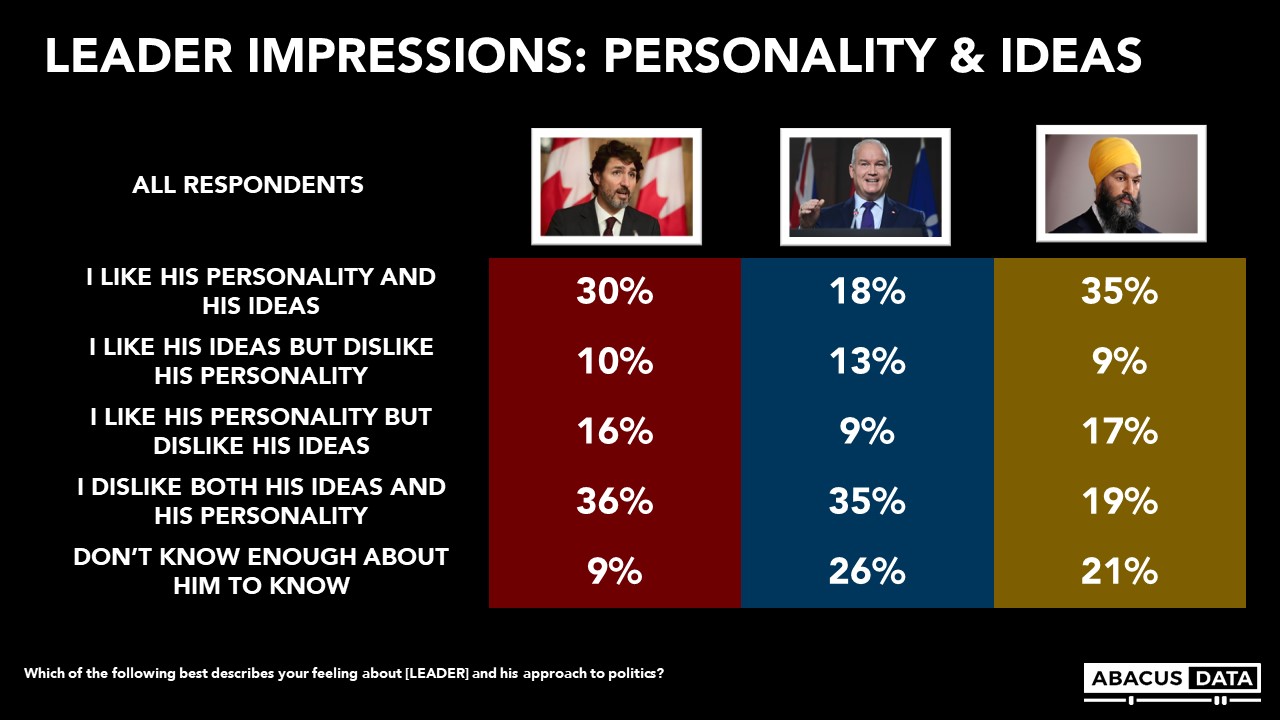
When we isolate those open to voting for each of the main parties, a similar picture emerges although the gaps are smaller.
Among those open to voting Liberal, 80% think Mr. Trudeau is friendly, 73% think he’s smart, and 70% think he’s compassionate. 64% think he’s a strong leader while 58% think he shares their values. But as a liability, about 1 in 4 of those open to voting Liberal think Mr. Trudeau is fake and untrustworthy.
For Conservative accessible voters, 73% think Mr. O’Toole is smart, 65% think he’s a strong leader, while 64% think he’s friendly. Fewer feel he’s compassionate (57%), share their values (59%) or understands people like them (59%). About 1 in 5 think Mr. O’Toole is untrustworthy (22%) or fake (19%).
For Mr. Singh, who has the most room to grow among his accessible voters, 85% think he’s friendly, 81% think he’s smart, and 79% think he’s compassionate. But he also scores high on empathy (75%) and shares my values (71%). Fewer describes him as untrustworthy (17%) or fake (12%).
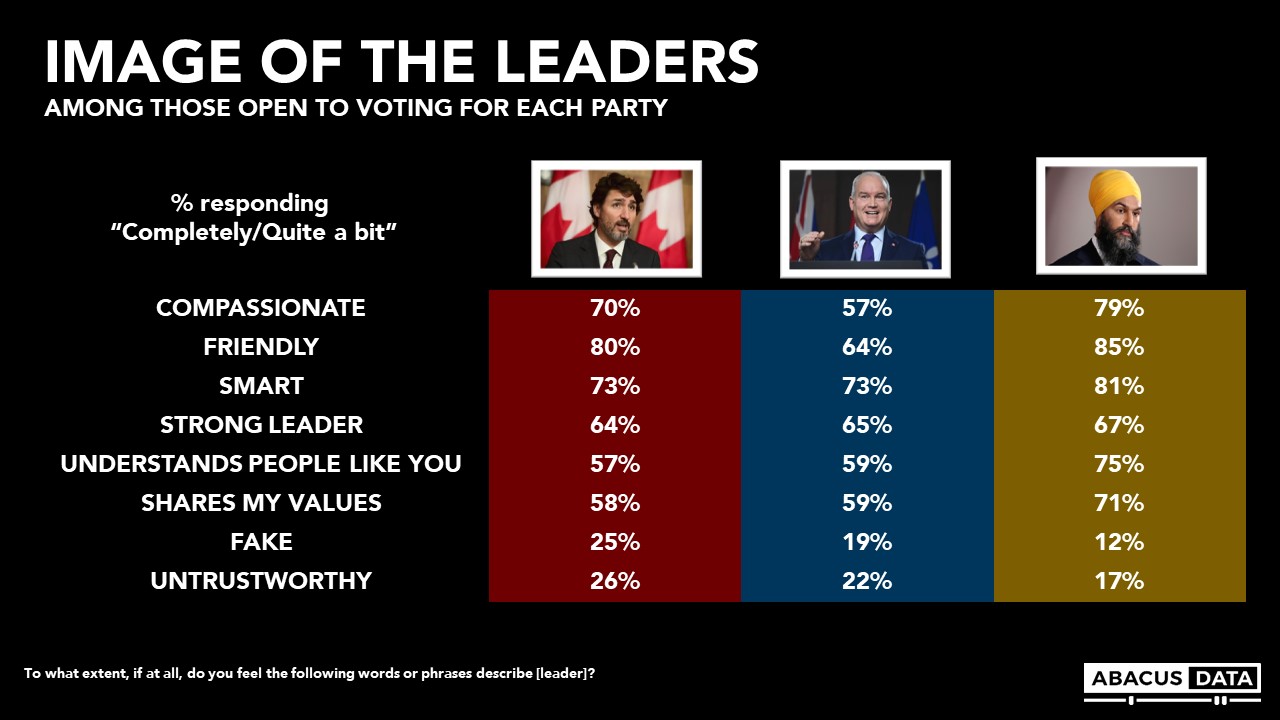
When we look at the 21% of the electorate we consider Liberal/NDP Switchers (those whose first choice is either Liberal or NDP and whose second choice is either Liberal or NDP), Mr. Singh leads Mr. Trudeau on all positive measures. The gap on “strong leader” is smaller than the others but Mr. Singh has a 13-point advantage on “compassionate”, a 16-point advantage on “smart” and an 18-point margin on “shares my values”.
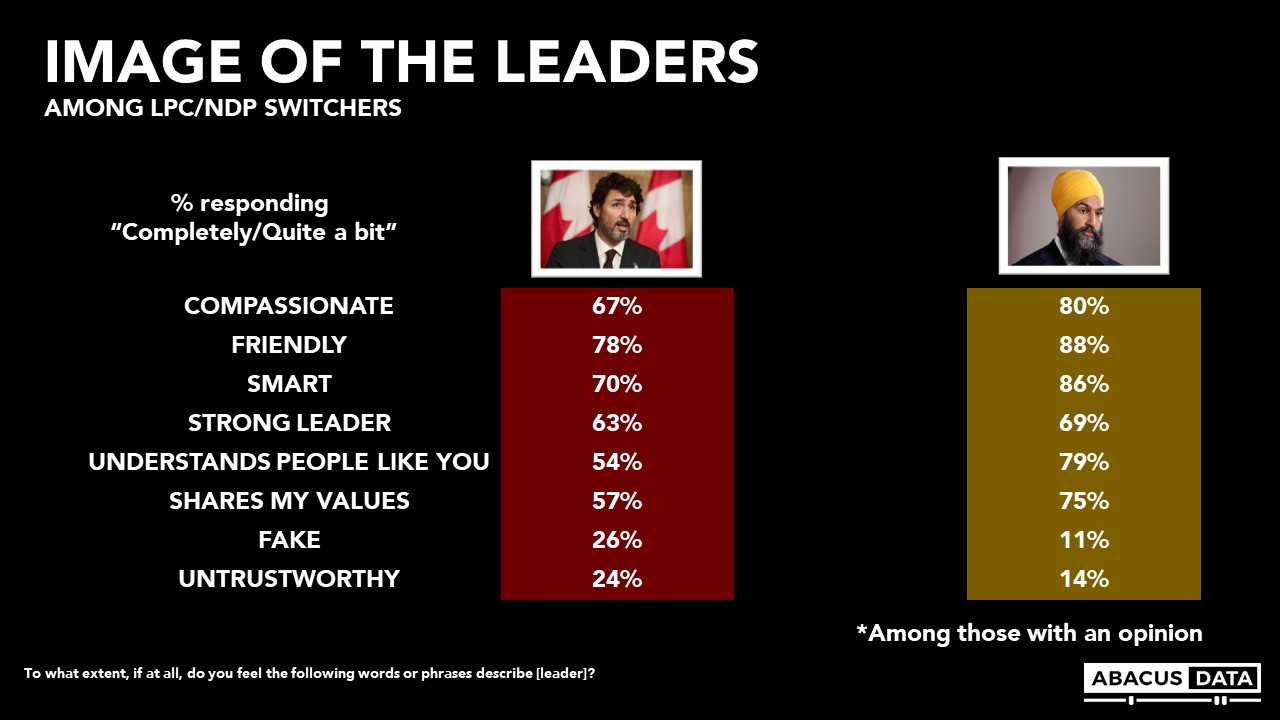
When we look at the 9% of the electorate we consider Liberal/Conservative Switchers, Mr. Trudeau leads Mr. O’Toole on “compassion” (+11), “friendly” (+20), “empathy” (+14) and “shares my values” (+7). But Mr. O’Toole leads on “smart” (+5), “strong leader” (+5). Both are about equal on perceptions they are “fake” or “untrustworthy”.
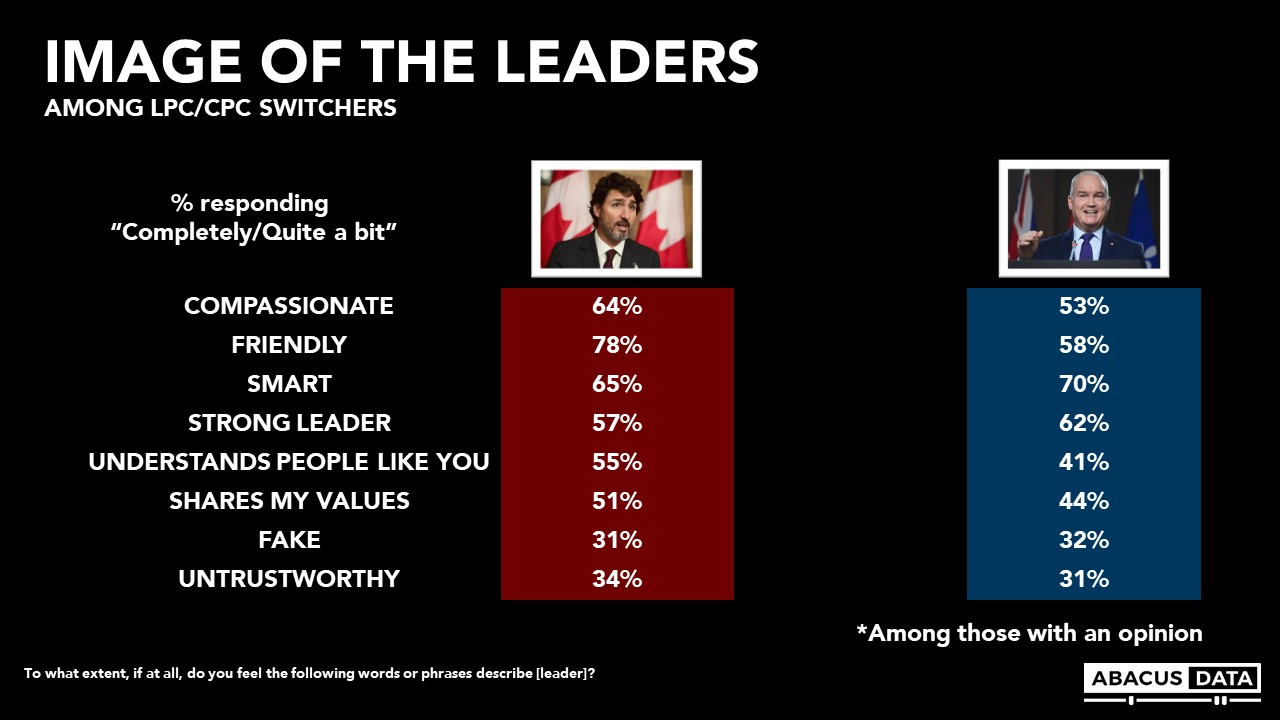
UPSHOT
This analysis helps us understand the role leadership and character may be playing in this campaign. Mr. Singh clearly has an advantage over the other two leaders on general likeability and positive traits. He benefits from being liked by those across the political spectrum, many of whom tell us they’d never vote NDP. For example, 15% of those who have a positive view of Mr. Singh say they would not consider voting NDP. That’s higher than the equivalent cut for the Liberals and Conservatives.
For Mr. O’Toole, this data shows there’s still an opportunity for him to increase his profile and improve his overall image. His liabilities are perceptions about values and empathy which often are liabilities for Conservative leaders. But he holds his own on being smart and a strong leader.
For Mr. Trudeau, this data shows that impressions of him are largely baked in and will be harder to change. Six years in office have taken a toll on his image, especially around empathy, authenticity, and trustworthiness. That being said, he’s more popular today than he was at this point in the last campaign and carries many assets and is well-regarded by those open to voting Liberal (which is the largest group in the electorate).
Whether Mr. Singh can capitalize on the goodwill though remains to be seen. When Jack Layton broke through in 2011, he had two very polarizing (Harper) and unpopular (Ignatieff) leaders to contrast with.
He’s facing a different set of opponents this time and many of those who like him are currently voting for other parties. His popularity may help him consolidate his vote share and insulate the NDP from strategic considerations.
Our analysis shows that being liked is not a function of just one or two positive attributes. Being compassionate drives Singh’s evaluation but does not impact O’Toole or Trudeau. Voters generally view Trudeau as compassionate but this does not make them feel more favourably towards him.
There are, however, two negative attributes that strongly impact leader evaluations for all three leaders – being perceived as fake and untrustworthy. Not surprisingly, these are the two main negative attack strategies of the parties.
METHODOLOGY
The data in this report come from a national survey of 2,000 Canadian adults eligible to vote from August 17 to 22, 2021. A random sample of panellists was invited to complete the survey from a set of partner panels based on the Lucid exchange platform. These partners are double opt-in survey panels, blended to manage out potential skews in the data from a single source.
The margin of error for a comparable probability-based random sample of the same size is +/- 2.2% 19 times out of 20, respectively. The data were weighted according to census data to ensure that the sample matched Canada’s population according to age, gender, educational attainment, and region.
The survey was paid for by Abacus Data Inc.
Abacus Data follows the CRIC Public Opinion Research Standards and Disclosure Requirements that can be found here: https://


[sc name=”signup”]
ABOUT ABACUS DATA
We are the only research and strategy firm that helps organizations respond to the disruptive risks and opportunities in a world where demographics and technology are changing more quickly than ever.
Find out more about what we are doing to help clients respond to the COVID-19 pandemic.
We are an innovative, fast-growing public opinion and marketing research consultancy. We use the latest technology, sound science, and deep experience to generate top-flight research-based advice to our clients. We offer global research capacity with a strong focus on customer service, attention to detail and exceptional value.
We were one of the most accurate pollsters conducting research during the 2019 Canadian Election.
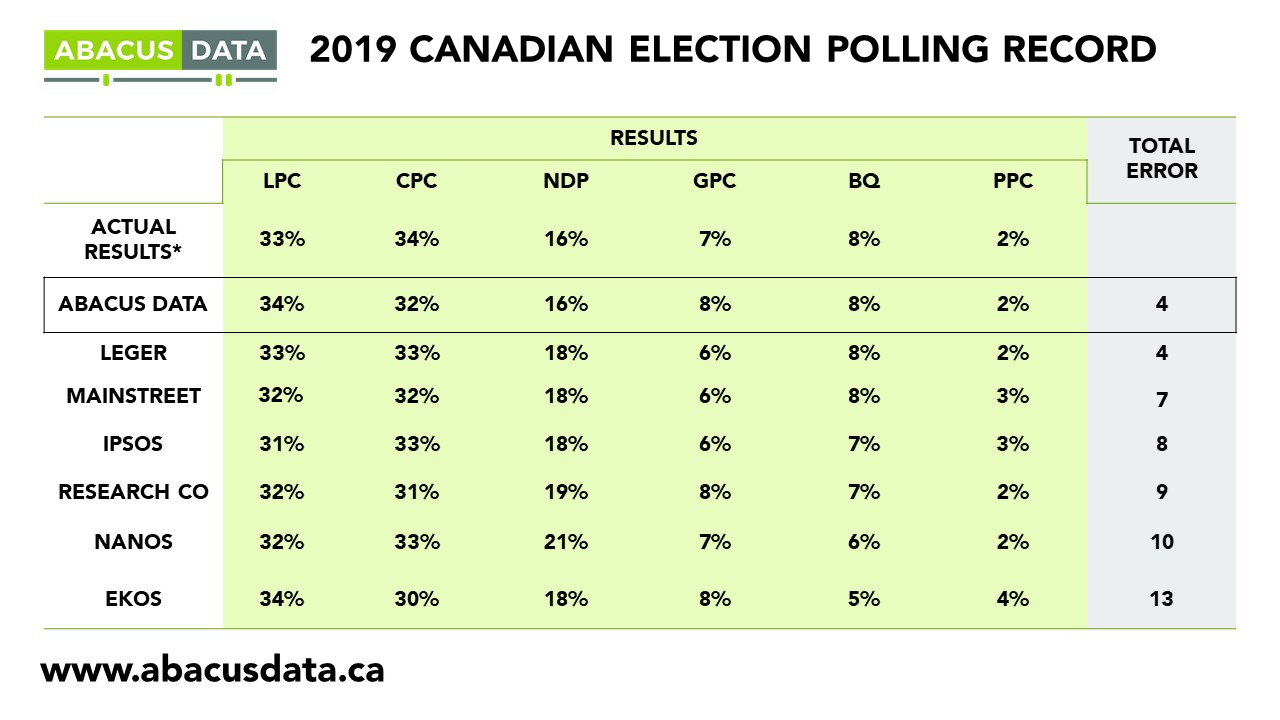
Contact us with any questions.
Find out more about how we can help your organization by downloading our corporate profile and service offering.
[sc name=”signup”]




